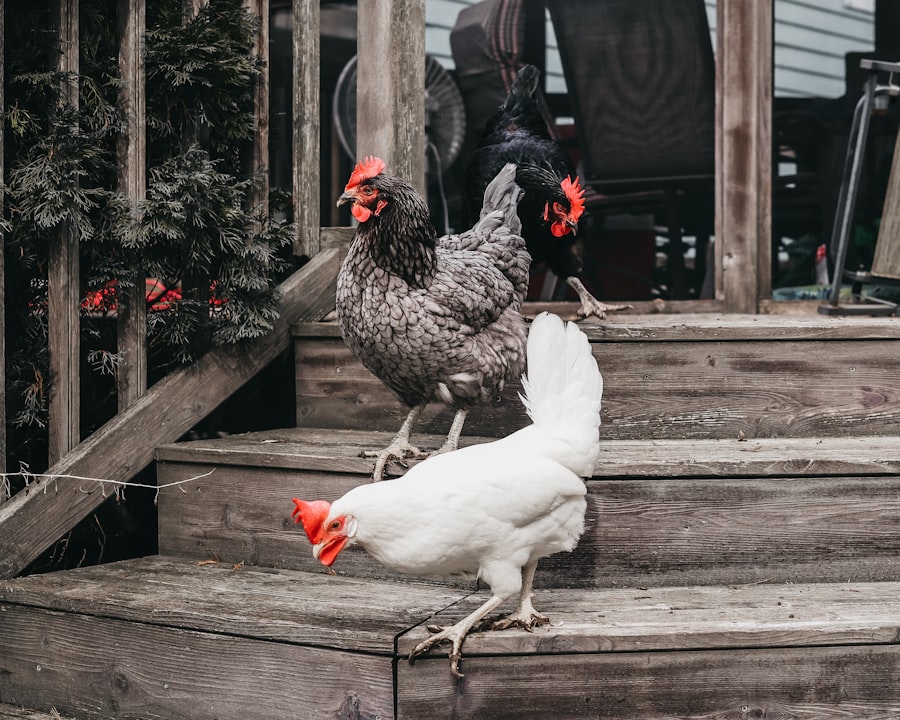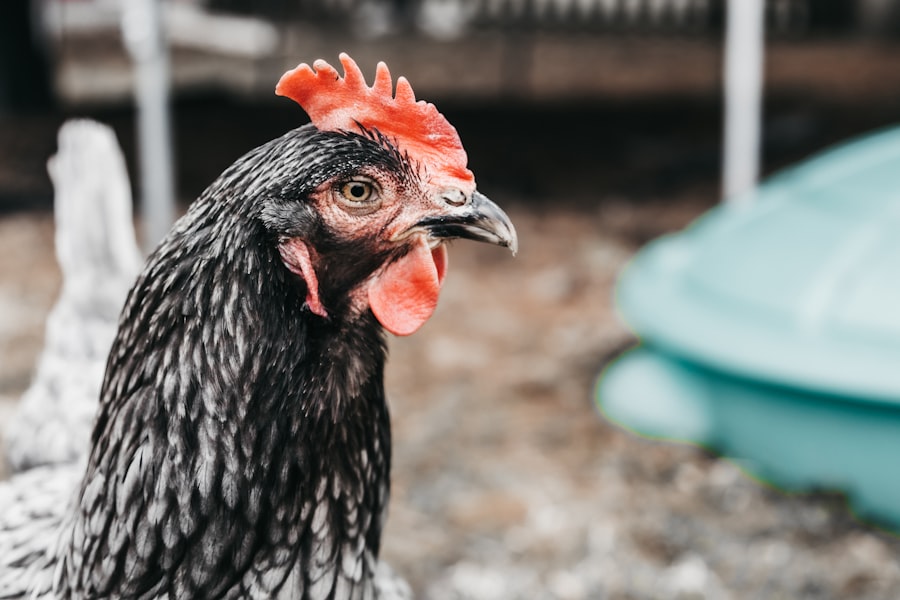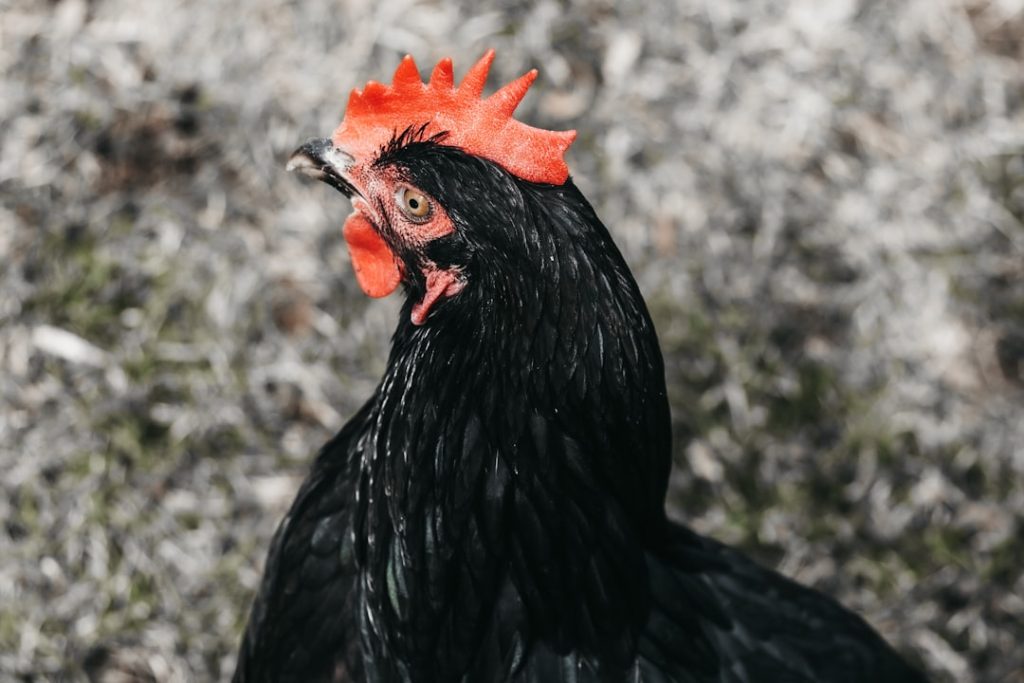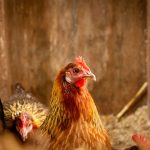Rooster crowing is a natural behavior that serves multiple purposes. Primarily, morning crowing is used to establish dominance and mark territory, with roosters asserting their presence to other roosters in the vicinity. Crowing also functions as a communication tool within the flock, potentially alerting hens to danger or gathering them for various activities.
The rooster’s internal clock plays a significant role in morning crowing. Roosters are naturally early risers, often beginning to crow at dawn. This behavior is deeply rooted in their biology and is influenced by environmental factors such as increasing light and temperature changes.
Roosters are also responsive to external stimuli like sounds and movements, which can trigger crowing. It is important to note that crowing is an instinctual behavior that cannot be completely eliminated. However, understanding these natural behaviors can help chicken keepers develop strategies to manage and reduce excessive crowing, creating a more harmonious environment for both the chickens and their caretakers.
Table of Contents
- 1 Providing a comfortable and secure coop environment
- 2 Implementing a consistent feeding schedule
- 3 Installing blackout curtains or shades in the coop
- 4 Using white noise or calming music to reduce crowing
- 5 Providing enrichment activities to keep chickens occupied
- 6 Seeking professional advice if excessive crowing persists
- 7 FAQs
- 7.1 What causes chickens to yell in the morning?
- 7.2 How can I keep chickens from yelling in the morning?
- 7.3 Are there any specific breeds of chickens that are quieter in the morning?
- 7.4 Can I train my chickens to be quieter in the morning?
- 7.5 Are there any legal restrictions on keeping chickens in residential areas due to noise?
Key Takeaways
- Understanding the natural instinct and reasons behind morning crowing can help in managing and addressing the behavior effectively.
- Providing a comfortable and secure coop environment can help reduce stress and anxiety in chickens, leading to less crowing.
- Implementing a consistent feeding schedule can help regulate the chickens’ biological clock and reduce the need for excessive crowing.
- Installing blackout curtains or shades in the coop can help simulate natural light patterns and encourage chickens to sleep longer, reducing early morning crowing.
- Using white noise or calming music in the coop can help mask external sounds and create a soothing environment, reducing the urge to crow excessively.
- Providing enrichment activities such as pecking toys or hanging treats can keep chickens occupied and mentally stimulated, reducing boredom-related crowing.
- Seeking professional advice from a veterinarian or animal behaviorist is recommended if excessive crowing persists despite implementing various management strategies.
Providing a comfortable and secure coop environment
Optimizing Coop Conditions
The coop should be well-ventilated and free from drafts, as temperature fluctuations can also contribute to crowing behavior. Providing roosts and nesting boxes can help chickens feel secure and comfortable, which can reduce stress and minimize crowing.
Ensuring Security
In terms of security, it’s crucial to fortify the coop to protect the chickens from predators and other potential threats. This can be achieved by using sturdy fencing, predator-proof latches, and secure locks on doors and windows.
Reducing Stress and Crowing
By creating a safe and secure environment for the chickens, they will feel less anxious and vulnerable, which can help reduce excessive crowing. Additionally, providing ample bedding, such as straw or wood shavings, can create a cozy and inviting space for the chickens to rest and relax, further minimizing stress and crowing behavior.
Implementing a consistent feeding schedule

Maintaining a consistent feeding schedule is crucial for managing morning crowing in chickens. When chickens are hungry, they may become more vocal and agitated, leading to increased crowing. By providing regular meals at the same time each day, chicken owners can help regulate their flock’s behavior and minimize excessive crowing.
It’s important to offer a balanced diet that meets the nutritional needs of the chickens, including a mix of grains, seeds, fruits, vegetables, and high-quality poultry feed. In addition to regular meals, it’s also important to ensure that the chickens have access to fresh water at all times. Dehydration can lead to stress and discomfort, which can contribute to increased crowing behavior.
By keeping water sources clean and readily available, chicken owners can help keep their flock hydrated and content, reducing the likelihood of excessive crowing. It’s also important to monitor the chickens’ feeding habits and adjust portion sizes as needed to prevent overeating or food scarcity, both of which can lead to increased crowing.
Installing blackout curtains or shades in the coop
Installing blackout curtains or shades in the coop can help regulate light exposure and minimize morning crowing in chickens. Roosters are known to be sensitive to changes in light, and they often start crowing at the first sign of dawn. By using blackout curtains or shades, chicken owners can control the amount of light that enters the coop, which can help delay the roosters’ natural instinct to crow at the break of day.
This can be particularly effective during the summer months when the days are longer, and natural light exposure is more pronounced. Blackout curtains or shades can also help create a more conducive sleeping environment for the chickens, as they block out external stimuli such as street lights or passing cars that may trigger crowing behavior. By creating a dark and peaceful sleeping space, chicken owners can help ensure that their flock gets a restful night’s sleep, which can lead to reduced crowing in the morning.
It’s important to choose blackout curtains or shades that are durable and easy to clean, as they will be exposed to dust, moisture, and other environmental factors in the coop.
Using white noise or calming music to reduce crowing
Another effective strategy for reducing morning crowing in chickens is to use white noise or calming music in the coop. White noise machines or calming music can help drown out external sounds that may trigger crowing behavior in roosters. By creating a soothing auditory environment, chicken owners can help minimize stress and anxiety in their flock, which can lead to reduced crowing in the morning.
White noise machines can also help regulate sound levels within the coop, creating a more peaceful atmosphere for both the chickens and their human caretakers. Calming music has been shown to have a positive impact on animal behavior, including chickens. By playing soft, instrumental music or nature sounds in the coop, chicken owners can help create a relaxing ambiance that promotes restful sleep and reduces crowing.
It’s important to choose music or white noise that is gentle and non-disruptive, as loud or jarring sounds may have the opposite effect and increase stress levels in the chickens. Additionally, it’s important to monitor the chickens’ response to white noise or music and adjust the volume or type of sound as needed to achieve the desired calming effect.
Providing enrichment activities to keep chickens occupied

Reducing Boredom and Excessive Crowing
Boredom and lack of stimulation can lead to increased vocalization in chickens, including morning crowing. By providing enrichment activities such as hanging treats, puzzle feeders, or perches for climbing and roosting, chicken owners can keep their flock mentally engaged and physically active, reducing the likelihood of excessive crowing.
Promoting Natural Behaviors
Enrichment activities also provide opportunities for natural behaviors such as pecking, scratching, and exploring, which can help alleviate stress and promote overall well-being in the chickens. In addition to physical enrichment activities, it’s also important to provide mental stimulation for the chickens.
Maintaining Mental Stimulation
By keeping the chickens mentally stimulated, chicken owners can help prevent boredom and reduce excessive vocalization, including morning crowing. This can be achieved through activities such as scattering food for foraging, introducing new objects or toys into the coop, or rotating their outdoor grazing area to expose them to different sights and smells. It’s important to regularly rotate and refresh enrichment activities to maintain their effectiveness and keep the chickens engaged.
Seeking professional advice if excessive crowing persists
If despite implementing various strategies excessive crowing persists in your flock it may be time to seek professional advice from a veterinarian or animal behaviorist who specializes in poultry. A professional can conduct a thorough assessment of your coop environment, feeding schedule, enrichment activities, and other factors that may be contributing to excessive crowing in your flock. They can provide personalized recommendations based on your specific situation and help you develop a comprehensive plan for managing and reducing excessive vocalization in your chickens.
A professional may also be able to identify any underlying health issues or behavioral problems that could be contributing to excessive crowing in your flock. They can conduct physical exams, blood tests, or behavioral assessments to rule out any medical conditions or stressors that may be causing your chickens to vocalize excessively. By addressing any underlying issues with expert guidance you can work towards creating a more peaceful environment for your flock while ensuring their overall health and well-being.
In conclusion, understanding the reasons behind morning crowing in chickens is essential for developing effective strategies for managing this natural behavior. By providing a comfortable and secure coop environment, implementing a consistent feeding schedule, installing blackout curtains or shades in the coop, using white noise or calming music to reduce crowing, providing enrichment activities to keep chickens occupied, and seeking professional advice if excessive crowing persists you can create a peaceful living environment for your flock while promoting their overall health and well-being.
If you’re looking for ways to keep your chickens quiet in the morning, you may also be interested in learning about how to insulate a chicken coop. Insulating your coop can help regulate the temperature and reduce noise, creating a more comfortable environment for your chickens. Check out this article on how to insulate a chicken coop for more information.
FAQs
What causes chickens to yell in the morning?
Chickens typically yell in the morning as a natural behavior to communicate with other chickens, establish their territory, or signal the start of the day.
How can I keep chickens from yelling in the morning?
To keep chickens from yelling in the morning, you can ensure they have enough food and water before bedtime, provide a comfortable and secure coop, and consider using blackout curtains to block out the early morning light.
Are there any specific breeds of chickens that are quieter in the morning?
Some chicken breeds are known to be quieter than others, such as Silkies, Cochins, and Orpingtons. These breeds may be a good choice if you are looking for quieter chickens.
Can I train my chickens to be quieter in the morning?
While you cannot completely eliminate a chicken’s natural instinct to vocalize in the morning, you can train them to be quieter by establishing a routine, providing enrichment activities, and rewarding calm behavior.
Are there any legal restrictions on keeping chickens in residential areas due to noise?
Some residential areas may have specific regulations regarding noise from animals, including chickens. It is important to check with local authorities or homeowner’s associations to ensure compliance with any noise ordinances.
Meet Walter, the feathered-friend fanatic of Florida! Nestled in the sunshine state, Walter struts through life with his feathered companions, clucking his way to happiness. With a coop that’s fancier than a five-star hotel, he’s the Don Juan of the chicken world. When he’s not teaching his hens to do the cha-cha, you’ll find him in a heated debate with his prized rooster, Sir Clucks-a-Lot. Walter’s poultry passion is no yolk; he’s the sunny-side-up guy you never knew you needed in your flock of friends!







